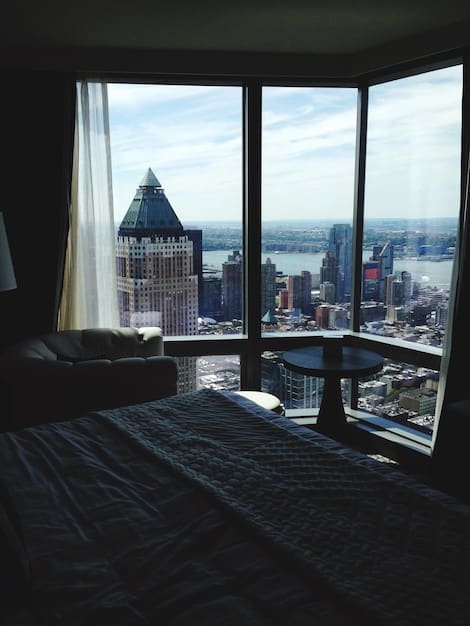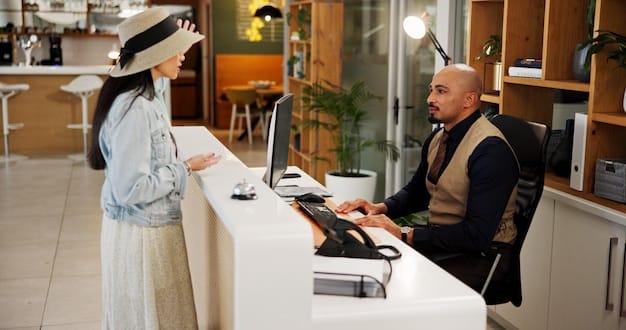Master Hotel Upgrades: Suite for Standard Room Price Secrets

Anúncios
Unlocking complimentary hotel suite upgrades isn’t just luck; it involves strategic planning, effective communication, and understanding hotel operations to significantly enhance your travel experience without additional costs.
Anúncios
Ever dreamed of walking into a hotel and being told, “Your room has been upgraded to a suite, free of charge”? For many, this sounds like a fantasy, a rare occurrence reserved for an elite few. However, gaining complimentary upgrades to a luxurious suite for the price of a standard room is an achievable reality. It transcends mere chance, relying instead on a blend of savvy strategies, opportune timing, and a touch of genuine human connection. This guide aims to demystify the art of the hotel upgrade, providing actionable insights derived from industry knowledge and real-world success stories. We delve into the nuanced tactics that can transform your average stay into an extraordinary experience, proving that a little insider knowledge can go a long way in the world of hospitality. Prepare to unlock a new level of travel luxury as we explore the **Secret Hotel Upgrade Strategies: How to Score a Suite for the Price of a Standard Room**.
The Foundation of an Upgrade: Loyalty, Timing, and Reputation
Achieving a significant hotel upgrade often begins long before you even speak to a front desk agent. It’s a cumulative effort built on understanding how hotels operate and positioning yourself as a guest they’d be eager to reward. Loyalty programs, the time of your booking and check-in, and even your online reputation play pivotal roles in setting the stage for a potential upgrade. Hotels, like any business, value repeat customers and positive word-of-mouth, often prioritizing these over a one-time transaction.
Loyalty programs are perhaps the most direct route to an upgrade. Most major hotel chains offer tiered membership levels that come with a host of benefits, including complimentary room upgrades. Attaining elite status, whether through frequent stays or co-branded credit cards, often places you at the top of the list for any available upgrades. Hoteliers are incentivized to recognize and reward these high-value guests, not only to thank them for past business but also to encourage future bookings. It’s a symbiotic relationship where loyalty pays dividends in luxury.
Anúncios
Leveraging Loyalty Programs Effectively
To maximize your chances through loyalty, it doesn’t always mean spending exorbitant amounts. Strategic registration and consistent engagement can elevate your status. Consider these points:
- Consolidate Stays: Focus your bookings with one or two hotel chains to accumulate points and nights quickly.
- Utilize Co-Branded Credit Cards: Many hotel credit cards offer automatic elite status or significant tier-qualifying points upon signup and spending.
- Join Partner Programs: Some airlines or credit card companies have partnerships that grant hotel status without direct hotel stays.
Beyond loyalty, timing is everything. Weekends, holidays, and peak season are generally bad times to ask for an upgrade because hotels are often at full capacity. Conversely, weekdays, during shoulder seasons, or when a hotel is less busy are prime opportunities. Hotels prefer to fill their higher-category rooms rather than leave them empty, especially if it costs them nothing to do so. A less crowded hotel means more available suites and a higher likelihood of the front desk having the discretion to offer them.
Your reputation as a traveler also impacts your upgrade potential. While not as quantifiable as loyalty status, things like being a respectful guest, avoiding negative online reviews, and even having a positive social media presence can subtly influence a hotel’s willingness to go the extra mile for you. Hoteliers often keep notes on guest preferences and past behaviors, and a history of being a “good” guest can certainly work in your favor. It’s about being an ideal customer, not just someone seeking a handout.
Another crucial element is the type of room you initially book. While it might seem counterintuitive, booking the absolute cheapest room doesn’t always yield the best upgrade opportunities. Sometimes, booking a slightly higher category room, perhaps one with a better view or greater square footage, positions you better for a leap to a suite. The incremental jump from a premium room to a suite is often less significant for the hotel than from a basic standard room, making the upgrade more palatable for them.
Ultimately, the foundation for a successful upgrade lies in smart planning and a keen understanding of the hospitality ecosystem. It’s about playing your cards right, being a valued guest, and knowing when and how to approach the hotel. This groundwork can significantly increase your odds long before you even set foot in the lobby.
The Art of the Check-In Conversation: Diplomacy and Demeanor
Once you’ve laid the groundwork through loyalty and strategic timing, the check-in process becomes your primary stage. This is where your interpersonal skills come into play, potentially turning a standard reservation into a suite experience. The front desk agent is your gatekeeper to an upgrade, and how you approach them can make all the difference. Remember, they are professionals often dealing with a wide range of requests and sometimes demanding guests. A polite, positive, and understanding demeanor will always serve you better than an entitled or aggressive one.
Start with a genuine smile and a friendly greeting. Make eye contact and use their name if you notice it on their nametag. This immediately establishes a rapport and humanizes the interaction. Avoid launching directly into an upgrade request. Instead, engage in light conversation. Ask them how their day is going, or comment positively on the hotel’s ambiance. This simple courtesy can set a pleasant tone and make them more receptive to your future request. People are more inclined to help those they perceive as pleasant and respectful.
Crafting Your Upgrade Request
When the time feels right, and usually after they’ve confirmed your reservation details, you can subtly introduce your interest in an upgrade. Frame your request politely and without expectation. Avoid phrasing like, “I expect an upgrade” or “Are you going to upgrade me?” Instead, try phrases that suggest curiosity and flexibility. Here are some examples of effective requests:
- “I was wondering if there might be any availability for a room with a better view, or perhaps a larger room, for a special occasion?”
- “I’m really excited about my stay here, and I was just curious if there were any suite upgrades available for loyal guests like myself?”
- “Is there any possibility of a complimentary upgrade to a more spacious room or suite tonight? I’m celebrating X (anniversary, birthday, etc.).”
Notice the inclusion of “complimentary” and the underlying reason. While not always necessary, providing a genuine reason (like a special occasion, though avoid fabricating one) can sometimes tug at the heartstrings and give the agent a compelling reason to justify the upgrade internally. The key is to make it sound like a happy possibility, not a demand. Be prepared for a “no.” If they decline, thank them for checking and move on gracefully. Pushing further will only make the situation awkward and ensures you won’t get anything.
Timing your check-in also plays a role in this conversation. Arriving later in the day, say after 5 PM, can sometimes be advantageous. By this time, the hotel has a clearer picture of their occupancy for the night and what higher-category rooms might remain empty. An empty suite for the night costs the hotel nothing to give away, whereas an occupied standard room frees up inventory. Conversely, checking in too late might mean all the desirable upgrades have already been distributed. There isn’t a universally perfect time, but late afternoon generally offers a good balance.
The visual aspect of your presentation also matters, though indirectly. Being well-dressed and presenting yourself in a respectable manner can contribute to a positive first impression. While hotels certainly don’t discriminate based on attire, a polished appearance can subtly convey that you are the type of guest who will appreciate and respect a higher-category room. This is less about judgment and more about subconscious perceptions. It makes you appear like a guest worth investing in for a better experience, particularly for hotels that pride themselves on maintaining a certain clientele.

Ultimately, the check-in conversation is a delicate dance. It requires patience, politeness, and a flexible mindset. By treating the front desk agent with respect and making a reasonable, well-timed request, you significantly increase your chances of scoring that coveted suite upgrade and starting your trip in unparalleled comfort.
Beyond the Front Desk: Leveraging Connections and Digital Tools
While the check-in conversation is crucial, the pursuit of a complimentary suite upgrade extends beyond that initial interaction. In today’s interconnected world, leveraging digital tools and even cultivating connections can provide alternative pathways to luxury. These modern strategies complement traditional methods, offering more avenues for the savvy traveler to explore.
One increasingly effective method is using social media. Many hotels, particularly those in the luxury segment, maintain active presences on platforms like Twitter, Instagram, or even LinkedIn. A polite, publicly visible message to the hotel’s official account a few days before your arrival, expressing your excitement about your stay and subtly hinting at a special occasion, can sometimes catch the attention of their social media or PR team. These teams are often empowered to surprise and delight guests, especially if it leads to positive social media buzz. Just remember to keep it professional and respectful, avoiding demands.
Digital Strategies for Upgrades
- Tweet or Message the Hotel: A few days before arrival, express excitement about your stay, tagging the hotel. A polite, subtle hint about a special occasion can sometimes work wonders.
- Utilize Hotel Apps: Some hotel apps allow pre-check-in, manage preferences, or even offer chat functionalities. Using these platforms to reiterate loyalty or special requests can be effective.
- Monitor Email Promotions: Occasionally, hotels might send out last-minute upgrade offers to loyalty members for underbooked dates, especially if they have excess suite inventory.
Another powerful digital tool is the hotel’s own app or online chat feature. Many modern hotels have robust apps that allow for pre-check-in, room selection, and even direct messaging with staff. This can be an excellent, less confrontational way to inquire about upgrades. You might send a message a day before arrival asking if any larger rooms or suites have become available at check-in, again, always politely and without demanding. These digital avenues often streamline communication and can sometimes grant access to information or opportunities not readily available at the front desk in person.
Cultivating connections within the hospitality industry, while not feasible for every traveler, can lead to significant advantages. If you have friends, family, or professional contacts who work for a particular hotel chain or even within the broader travel industry, a gentle inquiry about potential “friends and family” rates or internal upgrade opportunities might be fruitful. Many hotel employees receive special codes or benefits they can extend to others, though this is entirely at their discretion and should never be presumed. Building good relationships with travel agents can also be beneficial, as they often have direct lines to hotel management and can sometimes negotiate on your behalf, especially for high-value bookings.
Emailing the hotel directly a few days before your arrival is another underutilized strategy. Address your email to the General Manager or Front Office Manager if you can find their contact information on the hotel’s website. Explain your loyalty, excitement about your stay, and politely inquire about the possibility of an upgrade for a special occasion. A well-written, respectful email can be reviewed by someone with more authority and discretion than a front desk agent, increasing your chances. This method allows for a more detailed explanation of why an upgrade would enhance your stay without putting immediate pressure on someone at the front desk during a busy check-in.
The key to these “beyond the front desk” strategies is subtle persistence and discretion. You’re not being demanding; you’re simply exploring all available avenues politely. By diversifying your approach and combining traditional charm with modern digital savvy, you significantly broaden your opportunities to score that luxurious suite for the price of a standard room, making your travel experience increasingly rewarding.
The Power of a “Special Occasion”: When and How to Mention It
One of the most frequently cited “secrets” to scoring a hotel upgrade is mentioning a special occasion. While this tactic can be remarkably effective, its success hinges on proper timing, authenticity, and a nuanced approach. Simply stating “it’s my birthday” won’t guarantee a suite; rather, it’s about how you weave this information into your interaction to evoke a positive response from the hotel staff. Hotels are in the business of creating memorable experiences, and helping guests celebrate milestones aligns perfectly with this mission.
The type of special occasion matters. Birthdays, anniversaries, honeymoons, and significant life achievements (like a promotion or graduation) are generally well-received. Less impactful “occasions” might include a casual weekend getaway or simply being on vacation. The more unique or personal the occasion, the more memorable and compelling it can be. However, authenticity is paramount. Never fabricate an occasion; it’s unethical and can backfire if detected, potentially harming your reputation with the hotel or chain.
Communicating Your Special Occasion
Timing your disclosure is critical. Mentioning it too early, like during the initial booking, can sometimes lead to the hotel trying to upsell you celebratory packages rather than offering a complimentary upgrade. The sweet spot is often during your check-in, or even a day or two before via a polite email or message to the hotel. This allows the hotel to note your request and potentially plan a surprise, without feeling pressured to allocate a suite weeks in advance.
- Booking Notes: You can add a polite note about a special occasion during booking, but be subtle. “Celebrating our anniversary, excited for a lovely stay.”
- Pre-Arrival Email: A day or two before, email the hotel to express excitement and casually mention the occasion. This humanizes your reservation.
- Check-in Conversation: This is often the most effective time. After pleasantries, mention it politely: “We’re celebrating our 10th anniversary, and we’re so thrilled to be staying here.”
When you do mention your special occasion, do so with an air of genuine excitement, not expectation. Frame it as part of your overall anticipation for the stay. For instance, at check-in, you might say, “We’re absolutely thrilled to be celebrating our anniversary here. We’ve heard wonderful things about your hotel, and we’re really looking forward to a relaxing getaway.” This conveys positive energy and gives the front desk agent a reason to want to enhance your stay, especially if a suite is available. It makes it less about ‘getting something’ and more about the hotel ‘providing a memorable experience.’
Some guests even bring a small token or mention a personal anecdote related to the occasion, which can further personalize the interaction. For example, “It’s my mother’s 70th birthday, and we chose your hotel because she loves the view of the park from your suites.” This adds a layer of emotional resonance that can be persuasive. However, be cautious not to overdo it; sincerity is key. Overly dramatic or elaborate stories can come across as manipulative.

It’s important to understand that a special occasion isn’t a guaranteed upgrade ticket. It’s a contributing factor that, when combined with other strategic elements like loyalty status, favorable occupancy, and your polite demeanor, significantly increases your chances. Hotel staff, particularly in luxury establishments, often enjoy being part of a guest’s special moments and are empowered to make those moments even better, provided the opportunity exists and you approach them with grace. The goal is to make them *want* to give you the upgrade because you’re a delightful guest celebrating a meaningful event, rather than feeling obligated.
The Power of Persistence (Delicate, Not Demanding) and Post-Stay Actions
While the initial check-in is a prime opportunity, the journey to a suite upgrade doesn’t necessarily end if your first attempt is unsuccessful. There’s a subtle art to persistence, one that emphasizes politeness and understanding rather than demandingness. Sometimes, opportunities for upgrades arise slightly later in the stay, and your actions during and after your visit can influence future outcomes. It requires a delicate balance of being present and open to possibilities without becoming a nuisance.
If you don’t receive an upgrade at check-in, don’t press the issue immediately. Accept the assigned room gracefully and proceed with your plans. However, you can make a discreet follow-up a few hours later, or even the next morning if you’re staying for multiple nights. This is particularly effective if you checked in during a peak rush. You might politely approach the front desk during a quieter period and simply ask if there’s been any change in availability for a larger room or a specific room type you prefer, perhaps referencing your loyalty status or special occasion again, but only if it feels natural and unforced. The key here is not to complain about your current room, but to express continued interest in an enhanced experience.
Subtle Persistence and Ongoing Engagement
- Follow-Up Discreetly: A few hours after check-in, or the next morning during a quieter time, politely check for new availability without fuss.
- Report Minor Issues Gracefully: If a minor issue arises, report it calmly. Sometimes, in resolving it, the hotel might offer an upgrade as a service recovery gesture.
- Engage with Staff: Be friendly and appreciative with all hotel staff, not just the front desk. Your overall positive impression can spread.
Another often overlooked opportunity arises if you encounter a minor issue with your standard room. If, for instance, the air conditioning isn’t working perfectly, or a light fixture is out, report it to the front desk or maintenance with a calm and understanding demeanor. Hotels often use service recovery as an opportunity to “wow” a guest. In some cases, a minor inconvenience in your standard room might prompt the hotel to offer an upgrade to a suite as a form of apology and to ensure your complete satisfaction. This is not about fabricating problems, but rather about gracefully allowing the hotel to go above and beyond when genuine issues arise. Your patience and kindness in such situations can be surprisingly rewarding. The hotel isn’t obligated to upgrade you, but it’s often a strategic move to turn a potentially negative experience into a positive one.
The demeanor you maintain throughout your stay also plays a role in future stays, if not the current one. Being a respectful, tidy, and generally pleasant guest can leave a positive impression in the hotel’s system. Many luxury hotels make notes on guest profiles – not just about complaints, but about positive interactions and overall guest behavior. If you are known as a hassle-free, appreciative guest, future upgrade requests might be looked upon more favorably, especially if your profile indicates you are a high-value customer in their loyalty program. This is less about immediate gain and more about building a history of positive interactions that can pay dividends over time.
Finally, your post-stay actions are surprisingly important. If you had a positive experience, especially if you received a complimentary upgrade, a gracious thank-you note or a positive online review mentioning the specific staff members who helped you can reinforce that good behavior. This public recognition is invaluable to hotels and encourages them to continue extending such courtesies. Furthermore, it solidifies your image as an appreciative guest, making you a prime candidate for future upgrades. It creates a positive feedback loop, where your gratitude translates into potential future rewards, proving that politeness and appreciation are indeed powerful currencies in the hospitality world.
Avoiding Common Upgrade Pitfalls: What NOT to Do
While the previous sections focused on what to do, understanding what to avoid is equally crucial in the pursuit of a complimentary hotel suite upgrade. There are several common pitfalls that can quickly diminish your chances, turning a potential luxury experience into a frustrating encounter. Navigating these “don’ts” requires self-awareness, respect for hotel staff, and a grasp of the industry’s operational realities. Remember, hoteliers are professionals, and they respond best to guests who treat them with respect and understanding. Demanding, manipulative, or dishonest behavior almost certainly guarantees a negative outcome and could even result in being flagged in the hotel’s system.
The most significant pitfall to avoid is being demanding or entitled. Approaching the front desk with an attitude that an upgrade is owed to you, rather than being a courtesy, is a surefire way to be denied. Phrases like, “I’m a loyal customer, so I expect a suite,” or “Why haven’t I been upgraded?” are immediate red flags. Hotel staff are trained to handle difficult guests, but they are also human and will be less inclined to go out of their way for someone who is perceived as aggressive or ungrateful. A polite request, even if persistent, is fundamentally different from a demanding one.
Mistakes to Avoid
- Being Demanding: Never act entitled to an upgrade. Hotels grant them out of goodwill, not obligation.
- Lying About Special Occasions: Faking an anniversary or birthday can be easily detected and damages your credibility.
- Complaining Aggressively: While reporting issues is fine, a hostile attitude won’t earn you anything but potentially a negative note on your profile.
Another major mistake is fabricating a special occasion or exaggerating a minor inconvenience to trick the hotel into an upgrade. Hoteliers are often adept at spotting dishonesty, and if caught, it can significantly harm your chances of any future favorable treatment, not just at that specific hotel but potentially within the entire chain. Authenticity breeds trust, and while a special occasion can be a powerful lever, it must be genuine. Furthermore, “fishing” for an upgrade by repeatedly reporting minor, non-existent issues in your room is unethical and will be quickly recognized by staff as manipulative behavior. This can lead to your requests being dismissed as disingenuous, and you might even be marked as a problematic guest.
Avoid checking in during peak hours with an upgrade request. While later check-in can be strategic, trying to make a complex upgrade request when the front desk is swamped with a long line of guests checking in will be poorly received. The staff simply won’t have the time or mental bandwidth to consider your request. Patience is a virtue here. If you arrive during a rush, complete your standard check-in, settle into your room, and then perhaps try a polite inquiry during a quieter moment or the next morning, as suggested previously.
Criticizing your assigned room or the hotel in general as a tactic to get an upgrade is also counterproductive. While constructive feedback is often welcome, disparaging your room (“This room is so small!” or “This view is terrible!”) will not inspire sympathy or generosity from the staff. Instead, it creates a negative atmosphere and makes you seem unappreciative. If you have a specific, reasonable preference (e.g., “Do you happen to have a room on a higher floor available?”), express it as a preference, not a complaint.
Finally, don’t make your pursuit of an upgrade the central focus of your entire trip. While it’s certainly a pleasant bonus, obsessing over it can lead to disappointment and detract from the enjoyment of your travels. Be strategic, be polite, but ultimately, be prepared to enjoy the room you paid for. The best upgrades often come when you least expect them, as a result of consistent, positive interactions rather than aggressive pursuit. By avoiding these common pitfalls, you not only maintain your dignity but also significantly increase the likelihood that hotels will want to give you that coveted suite.
Maximizing Your Next Reservation: Loyalty, Research, and Proactiveness
Securing a hotel upgrade isn’t just a one-time event; it’s a process that can be continuously refined and improved upon with each reservation. By adopting a proactive mindset and leveraging various resources, you can consistently maximize your chances of receiving preferential treatment, including those coveted suite upgrades. This involves strategic thinking before, during, and after your stay, making every travel experience a potential opportunity for luxury without the added cost.
One of the most impactful ways to maximize your next reservation is by committing to a hotel loyalty program and consistently striving for elite status. As discussed, this is often the most straightforward path to upgrades. Prioritize booking within your preferred hotel chain to accumulate points and nights. Explore co-branded credit cards associated with these programs, as they often offer shortcuts to elite status or significant bonus points that can be redeemed for free nights or upgraded experiences. Make sure you understand the specific benefits of each tier within your chosen program, and aim for the level that offers confirmed or space-available suite upgrades.
Strategic Planning for Future Upgrades
- Target Elite Status: Actively pursue and maintain elite status with one or two major hotel loyalty programs.
- Read Reviews & Hotel Policies: Research online reviews for feedback on upgrade success rates and understand the specific hotel’s upgrade policies.
- Personalize Your Profile: Keep your loyalty profile updated with preferences (e.g., high floor, quiet room) as these can subtly influence room assignments.
Thorough research before booking is another powerful tool. Read recent online reviews on platforms like TripAdvisor, Google Reviews, or specific travel forums. Pay attention to comments regarding upgrade success, particularly for those mentioning similar loyalty statuses or special occasions. Some properties are known to be more generous with upgrades than others, and identifying these can be a strategic advantage. Additionally, familiarizing yourself with the specific hotel’s layout and room categories can help you articulate a more precise upgrade request at check-in (e.g., “Do you have any junior suites facing the park available?”). Knowing whether a hotel has many suites or very few can temper your expectations and allow for more realistic requests.
Proactiveness extends to communicating with the hotel before your arrival. As mentioned in previous sections, a polite email to the hotel’s reservations or guest services department a few days in advance can be highly effective. This allows them to mark your reservation, note your special occasion or loyalty status, and potentially pre-assign a better room if available. This proactive communication signals to the hotel that you are an engaged guest who values their services, increasing the likelihood of a positive response. Make sure your communication is concise, clear, and always polite, reiterating your excitement for the upcoming stay.
Finally, maintain a positive and appreciative attitude throughout all your interactions, not just when seeking an upgrade. Thank staff members for their help, leave positive reviews when appropriate (especially if you received an upgrade), and consider direct feedback to management if someone went above and beyond. This creates a positive cycle: hotels value appreciative guests, and appreciative guests are often rewarded with better experiences. By consistently demonstrating that you are a pleasure to host, you establish a reputation that works in your favor, turning every future reservation into a potential for that delightful suite upgrade. It’s about building a long-term relationship, not just seeking a short-term gain.
| Key Strategy | Brief Description |
|---|---|
| 👑 Loyalty First | Focus on one or two hotel chains to achieve elite status, unlocking upgrade benefits. |
| 🗣️ Polite Request | Always ask for upgrades politely and with humility at check-in or beforehand. |
| 📅 Smart Timing | Check-in on less busy days or times (e.g., weekdays, late afternoon for a clearer picture of room availability). |
| 📧 Pre-Arrival Proactiveness | Email the hotel or use their app to mention loyalty or special occasions before arrival. |
Frequently Asked Questions About Hotel Upgrades
The ideal time to inquire about an upgrade is often later in the afternoon, typically after 4-5 PM, but before late evening. By then, the hotel has a clearer understanding of its occupancy for the night, including which higher-category rooms might remain unoccupied. This allows staff more discretion and opportunity to offer complimentary upgrades, as an empty suite yields no revenue for the hotel.
While hotel loyalty status, especially elite tiers, significantly increases your chances, it rarely guarantees a suite upgrade. Many programs offer “space-available” upgrades as a perk, meaning it depends on the hotel’s occupancy and a suite being free. Some top-tier statuses do offer confirmed suite upgrades or upgrade certificates, but these are generally exceptions for the most loyal guests.
Yes, discreetly mentioning a genuine special occasion (e.g., anniversary, birthday, honeymoon) can be a very effective strategy. Hotels often seek to enhance guest experiences for milestones. Do so politely and without expectation, perhaps at check-in or in a pre-arrival email. Avoid fabricating reasons, as sincerity is key for staff to genuinely want to celebrate with you.
Getting an upgrade when booking via third-party sites is generally more challenging. Hotels prioritize guests who book directly, especially loyalty members, as direct bookings yield higher revenue. While not impossible, your chances are significantly lower compared to booking directly or through an authorized travel agent, who might have specific hotel connections and preferred network benefits.
If your upgrade request is denied, simply accept it gracefully and thank the agent for checking. Do not press the issue further. Sometimes, you can politely inquire again a few hours later, or the next morning during a quieter time, if it feels appropriate. A positive, understanding demeanor is crucial, as being demanding or upset will only harm your chances in the future.
The Journey to Elevated Stays
The quest for a complimentary hotel suite upgrade is less about secret codes or magical phrases and more about an informed, respectful, and strategic approach to travel. It’s a testament to the power of understanding hotel operations, leveraging loyalty, and practicing genuine human connection. By consistently applying the strategies discussed—from cultivating elite status and timing your requests to employing a diplomatic demeanor and utilizing digital tools—you transform a standard booking into a potential luxury experience. Remember that the hospitality industry thrives on positive guest relations, and by being an appreciative, valued customer, you significantly increase your opportunities for elevated stays. Embracing these tactics not only enhances your current trips but also builds a foundation for a future filled with more comfortable, more memorable, and surprisingly more luxurious adventures, proving that with a little effort and savvy, a suite for the price of a standard room is an entirely achievable dream for any discerning traveler.





